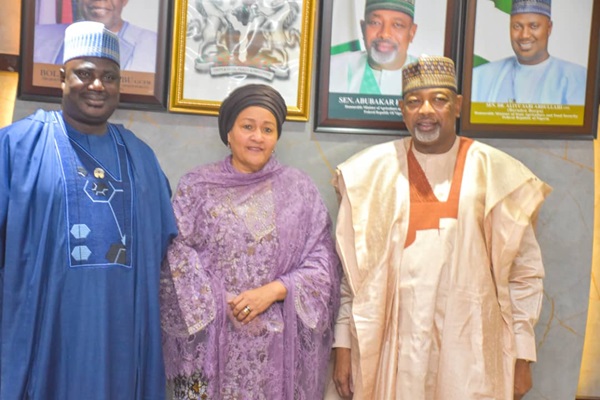
The United Nations has reaffirmed its commitment to supporting Nigeria in addressing pressing challenges such as food insecurity, climate change, and conflict, all of which pose significant threats to the nation’s development.
This assurance was given by the United Nations deputy secretary-general, Dr. Amina Mohammed, during her visit to the Federal Ministry of Agriculture and Food Security (FMAFS) headquarters in Abuja.
Mohammed emphasised that climate change has significantly impacted African countries, leading to food scarcity and exacerbating existing economic challenges. She pointed out that global supply chain disruptions have further compounded food security issues, affecting critical economic sectors across Nigeria and the continent. “The situation is made worse by a lack of financing, and we observe that economies across the globe, including Nigeria, are struggling,” she noted.
During her visit, Mohammed highlighted the importance of the United Nations’ ongoing efforts to support Nigeria’s development goals, particularly those related to the Sustainable Development Goals (SDGs). She stressed that the UN’s focus on sustainable development is closely aligned with the priorities of the Nigerian government, particularly SDG 1 (no poverty) and SDG 2 (zero hunger).
Mohammed expressed concern about the far-reaching consequences of inadequate food security on public health, particularly in terms of nutrition, and the overall well-being of women and children. “Without a robust food security plan, the health of the population, especially women and children, will be severely impacted. Last year, we assessed our global progress toward the 2030 agenda, and the results were not encouraging—we are only 17 per cent of the way to achieving the SDGs. This leaves us with significant challenges, but also opportunities to reset our strategies,” she added.
The UN’s strategy for supporting Nigeria includes building resilient food security systems that benefit both agriculture and livestock sectors. Mohammed underscored the need for the country to transition to green energy and improve digital connectivity, which would facilitate knowledge sharing and provide financial services, especially for women and young people. “Seventy percent of Africa’s population needs access to sustainable employment to drive development,” she emphasised, calling on developed countries to invest in African economies to help generate much-needed revenue.
Mohammed assured that the international community, through the UN, is committed to supporting Nigeria in meeting its development goals despite the challenges. She expressed optimism about Nigeria’s potential, stating, “I believe Nigeria has more potential than challenges and we look forward to supporting you in realising that potential.”
Minister of Agriculture and Food Security, Sen. Abubakar Kyari highlighted the critical nature of Nigeria’s partnership with the United Nations. He noted that this collaboration is essential for meeting the country’s immediate and long-term consumption demands. “The ministry is fully committed to providing the necessary policy direction to steer the agriculture and food security sector towards achieving the key priorities of the President’s 8-point agenda, which includes food security, economic growth, job creation, poverty eradication and inclusivity,” he said.
Kyari also mentioned that the ministry has been working closely with the Food and Agriculture Organisation (FAO) and the World Food Programme (WFP) to conduct the national agricultural census, which is crucial for the overall development of Nigeria’s agriculture sector. The UN, through UNICEF, has also been providing support for Nigeria’s food and nutrition security agenda, particularly in the fortification of food crops to combat malnutrition and stunted growth among children.
The minister emphasised the pivotal role agriculture plays in Nigeria’s economy and food system governance. He recalled the UN’s long-standing technical assistance in ensuring food security and nutrition in the country. “We appreciate the UN’s support, especially in initiatives like the Value Chain Development Programme and the Livelihood Improvement Family Enterprises Project in the Niger Delta (LIFE-ND). These projects aim to enhance income, food security and job creation for rural youth and women through sustainable agribusiness development,” Kyari explained.
He further stated that Mohammed’s visit was timely and would help create a paradigm shift that could further improve the agriculture sector. The visit is expected to strengthen the existing cooperation between Nigeria and the UN and pave the way for new partnerships aimed at sustainable development. “We must rise to the occasion and invest massively in agriculture, leveraging the UN Sustainable Development Goals (SDGs) 1 and 2. With your global influence, we hope to explore opportunities for Nigeria to create jobs, diversify the economy and reduce food imports,” he urged.
In his remarks, the Minister of State for FMAFS emphasised the need for Nigeria to enhance its research and development capabilities and infrastructure to contribute more significantly to the nation’s GDP. The collaboration between Nigeria and the UN is seen as a critical step in addressing the multifaceted challenges facing the country, particularly in the areas of food security, climate change and sustainable development.

